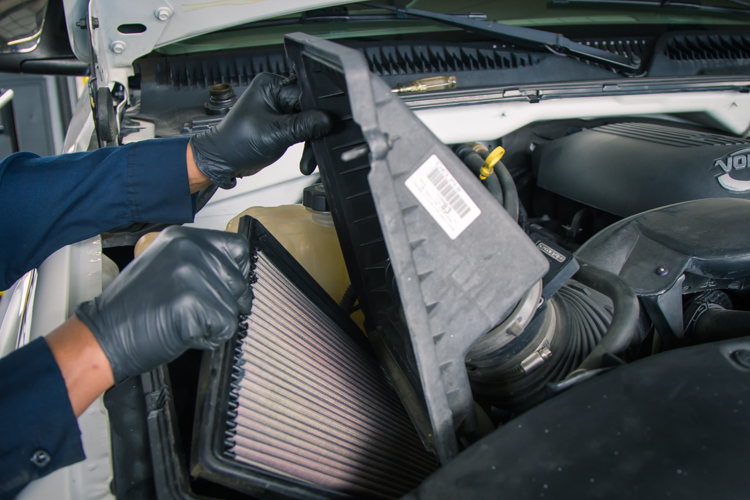Engine Air Filter

- Inspect and replace engine air filter
Why We Do It
- If an air filter were sufficiently dirty and damaged, it could allow harmful, abrasive contaminants into the combustion chamber.
- Improve gas mileage and engine performance
- Protect the life of your car’s engine by filtering out dust, contaminants, and foreign objects
- Most air filters should be replaced about every 15,000 miles, depending on driving conditions.
What Does an Engine Air Filter Do?
The engine air filter stops airborne contaminants from getting sucked into your vehicle's engine such as dust, leaves, and debris before it can do damage to the engine. If your air filter gets too dirty, your engine will not be able to suck enough air into the combustion chambers, causing the engine to run improperly or possibly even stop running.
Cabin Air Filter
- Inspect the cabin air filter(s), which can be in difficult to reach locations, and determine if it requires replacement. Some cars use two filters.
- Educate yourself about the cabin air filter, and replace it if you desire.
Why We Do It
- A cabin air filter cleans air entering your car through the car’s air, heater, and air conditioner vents.
- The concentration of unfiltered pollutants inside your vehicle can be more than six times higher than the outside air.
- Removes air pollutants that can cause health problems.
- The Bottom Line: Replacing the cabin air filter(s) is good for the health of the vehicle’s occupants.
What Does the Cabin Air Filter Do?
The cabin filter in your vehicle is responsible for filtering the air before it enters the vehicle’s cabin. The cabin air filter catches pollen, dust, dirt and other impurities from the air, keeping the air purified for the vehicle and its passengers. It’s important to keep the cabin air filter clean so when the heater or air conditioner is running, the air being emitted is quality air. The cabin air filter should be replaced every 15,000 to 30,000 miles or as needed.
How Does a Micron Cabin Air Filter Work?
Filters out 99.5% of airborne dust, pollen mold spores, and bacteria particles (as small as 2 microns). Electrostatically charged fibers polarize particles in the air and captures them in the filter medium.